|
|
|
Sort Order |
|
|
|
Items / Page
|
|
|
|
|
|
|
| Srl | Item |
| 1 |
ID:
129637


|
|
|
|
|
| Publication |
2014.
|
| Summary/Abstract |
The global financial crisis (GFC) and subsequent Eurozone sovereign debt crisis (ESDC) have made reform of the global financial governance regime a priority for governments around the world. Prior to the crisis, neoliberal policies agreed between the European Union and the USA created a financial governance regime based on the principle of free operation of the market through the norms of market self-regulation, equal access to the market, and stability via institutional supervision. How will global financial governance look like after these crises? And what role can the EU and China play in shaping this regime? This article argues that as a result of the GFC and the ESDC, stability is becoming a second principle of global financial governance, along with the free operation of the market. Meanwhile, European and Chinese views regarding the norms, rules, and decision-making procedures designed to implement those principles do not differ as much as they used to. Thanks to interactions at the bilateral and multilateral levels, the EU and China now have knowledge regarding how the other understands the role and characteristics that financial governance should have. This is leading to convergence in some areas and cooperation in others. Concurrently, there are also areas of competition. Analysing all of these is essential to understand how global financial governance might evolve, given the central role that the EU and China now play in this regime.
|
|
|
|
|
|
|
|
|
|
|
|
|
|
|
|
| 2 |
ID:
095619
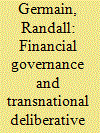

|
|
|
|
|
| Publication |
2010.
|
| Summary/Abstract |
Recent concern with the institutional underpinning of the international financial architecture has intersected with broader debates concerning the possibility of achieving an adequate deliberative context for decisions involving transnational economic governance. Scholars working within traditions associated with international political economy, deliberative democracy, cosmopolitanism and critical theory have informed this broader debate. This article uses this debate to ask whether the structure of financial governance at the global level exhibits the necessary conditions to support deliberative democracy. In particular, it considers the extent to which publicness and a public sphere have become part of the broader structure of financial governance. Although in some ways financial governance is a hard case for this debate, an argument can be made that a public sphere has emerged as an important element of the international financial architecture. At the same time, the analysis of the role of the public sphere in financial governance reveals important lessons which public sphere theorists and deliberative democracy advocates need to consider in order to extend their analysis into the realm of global political economy.
|
|
|
|
|
|
|
|
|
|
|
|
|
|
|
|
| 3 |
ID:
113044
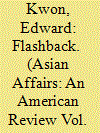

|
|
|
|
|
| Publication |
2012.
|
| Summary/Abstract |
This paper investigates financial liberalization in Mexico and South Korea from a comparative international political economy perspective. Though the two countries have a different political economy background, their experiences with financial repression and liberalization were similar, as was the manner in which they handled the subsequent huge inflow of capital. During the process of financial liberalization, both governments had their policy autonomy undermined by strong domestic interest groups as well as by influential international actors. Similar situational effects also prevailed during these two countries' financial crises: both experienced surges of international financial capital, had presidential elections during the crisis, and joined the OECD around that time. This paper sheds light on how the two countries experienced macroeconomic imbalances and financial crisis as a result of financial liberalization. The experience suggests meaningful lessons for other developing countries regarding the policy dilemmas that can arise from financial liberalization.
|
|
|
|
|
|
|
|
|
|
|
|
|
|
|
|
| 4 |
ID:
126090
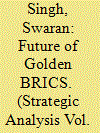

|
|
|
|
|
| Publication |
2013.
|
| Summary/Abstract |
With the successful holding of the fifth summit of Brazil, Russia, India, China and South Africa (BRICS) in Durban during March 26-27, 2013, this influential group of emerging economies completed its first important phase of genesis and evolution. The idea was floated in 2001 as an 'acronym' created by an investment banker of Goldman Sachs, Jim O'Neil who believed that the fast-growing economies of Brazil, Russia, China and India would be the single greatest game changers in coming times. The resultant informal group began holding annual summits in Yaketeranberg in 2009 and its pace of progress has since surprised many-including its own creator Jim O'Neil, who does not hide his disappointment at what has come about of his original vision.
|
|
|
|
|
|
|
|
|
|
|
|
|
|
|
|
| 5 |
ID:
099891
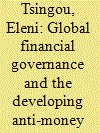

|
|
|
|
|
| Publication |
2010.
|
| Summary/Abstract |
The developing anti-money laundering (AML) regime exhibits a specific, non-financial set of policy preoccupations. Yet it is important to examine AML from a global financial governance perspective as the regime essentially imposes controls on the movement of money. This article analyses the political, institutional and regulatory evolution of the regime and argues that it serves to address a need for action on a diverse set of public policy goals (corruption, drug trafficking or terrorism); to relieve financial centres in advanced economies from offshore competitive pressures; and, unintentionally, to shape private sector practices so as to consolidate the position of key market institutions. The article stresses that the achievements with respect to its goals remain modest at best in relation to its ambitions, while important side-effects raise concerns about its role, efficiency and legitimacy. It also examines the possibility that AML has been tacitly accepted as the price for capital mobility.
|
|
|
|
|
|
|
|
|
|
|
|
|
|
|
|
| 6 |
ID:
181140
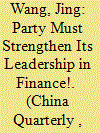

|
|
|
|
|
| Summary/Abstract |
This article examines the roles digital technologies have played in propelling the shifts in modes of financial governance which have been led by the Chinese Communist Party and enacted by a wide spectrum of regulative actors. Based on analyses of the laws, policies and regulations surrounding digital financial technologies, or so-called fintechs, as well as in-depth interviews with government officials and fintech business executives, I argue that the proliferation of fintechs challenged the existing regulatory schemes defined by the Central Bank and the State Council. This forced a reconsideration of the Chinese government's hegemonic strategies in governing the rapidly changing financial industries. While digital technologies have been promoted to accomplish the goals set by the Party for financial marketization and modernization, a set of institutions including regulatory, organizational and normative rules have been developed to strengthen the Party's control over the digitization of finance. This contradiction is pivotal to understanding the Party's financial policymaking in the digital age.
|
|
|
|
|
|
|
|
|
|
|
|
|
|
|
|
| 7 |
ID:
144468
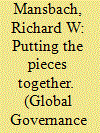

|
|
|
|
|
| Summary/Abstract |
This article examines the role of global financial institutions, the World Bank, and the International Monetary Fund, as well as the Group of 20 and the main European financial institution, the European Central Bank, in the aftermath of the 2008 financial crisis. The central question is whether these institutions are helping or hindering Europe's recovery. Looking at the activities of these institutions from 2008 to 2014, the article concludes that they have had little impact on the recovery itself. Instead, their focus has been on preventing further damage and eliminating the possibility of such a crisis in the future.
|
|
|
|
|
|
|
|
|
|
|
|
|
|
|
|
|
|
|
|
|